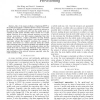Free Online Productivity Tools
i2Speak
i2Symbol
i2OCR
iTex2Img
iWeb2Print
iWeb2Shot
i2Type
iPdf2Split
iPdf2Merge
i2Bopomofo
i2Arabic
i2Style
i2Image
i2PDF
iLatex2Rtf
Sci2ools
PIMRC
2008
IEEE
2008
IEEE
An SMR based advance resource reservation scheme for combined mobility and QoS Provisioning
—One of the major problems of deploying RSVP in the mobile environment is called the advance resource reservation problem. If an RSVP reservation path is reserved in advance in the subnet that a mobile node will visit, the mobile node can continue its QoS session smoothly when it hands over to that subnet. However, if too many network resources are used for advance reservation, new QoS sessions originating from that subnet will experience a higher probability of being blocked needlessly. In this paper, we propose a new advance resource reservation scheme that properly constrains the amount of advance reservations in a subnet and only allows the mobile nodes with large value of session-to-mobility ratio (SMR) to make advance reservation. We evaluate the proposed scheme and the results show that our scheme can effectively reduce both active and passive reservation blocking probabilities and achieves a better utilisation of the network resources, especially when the traffic intensity i...
Related Content
| Added | 01 Jun 2010 |
| Updated | 01 Jun 2010 |
| Type | Conference |
| Year | 2008 |
| Where | PIMRC |
| Authors | Hao Wang, David I. Laurenson, Jane Hillston |
Comments (0)

